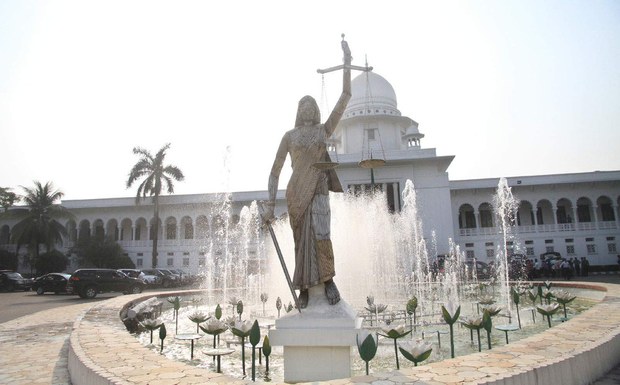Bangladesh: Islamic Group Wants Statue Removed from Supreme Court
2017.02.23
Dhaka
 Conservative Muslim group Hefazat-e-Islam wants this Statue of Justice removed from in front of the Bangladesh Supreme Court in Dhaka, Feb. 16, 2017.
Conservative Muslim group Hefazat-e-Islam wants this Statue of Justice removed from in front of the Bangladesh Supreme Court in Dhaka, Feb. 16, 2017.
A conservative Islamic group is calling on Bangladesh’s government to remove a statue representing justice in front of the Supreme Court building in Dhaka before the art piece’s official opening in April.
Hefazat-e-Islam, an Islamic organization dominated by hardline Qwami teachers, students, imams and their disciples at madrassas – Muslim boarding schools – has threatened a countrywide march where parishioners would exit mosques after prayers to chant provocative slogans, followed by public meetings as soon as March 3. Bangladesh is home to about 400,000 mosques.
Hefazat leaders said the processions would be larger than a protest in 2013 that demanded passage of a blasphemy law.
“The woman’s statue holding the scales cannot be the sign of justice. Allah is the sign of justice and the Quran is the rule of justice. Erecting a scale-holding Greek or Roman statue at the Supreme Court premises in a Muslim majority country like Bangladesh is in no way acceptable to the people,” Hefazat Joint Secretary Mohiuddin Ruhi told BenarNews.
Ruhi threatened to hold the march if the statue was not removed. He has suggested March 3 as a date after Friday prayers, but this has not been finalized.
He spoke a day after Hefazat Secretary General Junaid Babunagari threatened a larger gathering than the one four years ago.
On May 5, 2013, as many as 500,000 Hefazat activists, mostly students, flocked into the commercial hub of Motijheel – a section of Dhaka – to demand passage of a blasphemy law including capital punishment for all secular bloggers and atheists. The rioters set fire to buildings and vehicles for hours.
‘Is Bangladesh an Islamic state’
Attorney General Mahbubey Alam told BenarNews that he did not expect the government to remove the statue by artist Mrinal Haque.
“There are hundreds of sculptures and statues in Bangladesh. They [Hefazat] have unlimited demands. Is this possible to listen to them,” he asked.
Ruhi said Hefazat had filed documents on Feb. 13 demanding the statue’s removal to Prime Minister Sheikh Hasina and to Chief Justice S.K. Sinha. This is not the first time Hefazat challenged the top court.
In March 2016, Hefazat leaders attended proceedings after threatening to cripple the country with protests if the court stripped Islam of its standing as the state religion. A three-member panel of the High Court scrapped a petition to remove a 1988 amendment that made Islam the state religion without offering an explanation, leading to a Hefazat victory rally.
Professor Ajay Roy, father of slain secular blogger Avijit Roy, challenged Hefazat for demanding court action last year and for demanding that the statue be taken down.
“Why should the statue be removed? Is Bangladesh an Islamic state? This is a secular country. The scale is the symbol of justice,” Roy told BenarNews.
Khalid Mahmud Chowdhury, an organizing secretary of the ruling Awami League party, supported government efforts to break up the 2013 protests.
“The Hefazat has no popular support. They are simply trying to play politics on the pretext of protecting Islam,” he told BenarNews.







